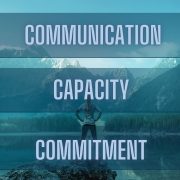RECHARGING LEADERS: Redefining Empathy and Resilience in the Workplace
In a recent coaching session, a leader, who is very caring and in touch with his people, told me of a recent exchange he had with one of his team members where he outlined his expectations for the role he was in. The expectations didn’t seem excessive to me, but the employee responded with a letter to HR that his manager was “creating an unsafe work environment and putting unnecessary stress” on him. He expressed that this was a trauma he was experiencing at work that necessitated a stress leave.
I know there are always two sides to a story. I also know that many conscious, caring leaders grapple with how to build “high performing” cultures while navigating between holding people accountable for performance and avoiding being overly harsh or creating unnecessary stress on those they lead and serve.
There has been an important shift in recent years that emphasizes employees as whole people rather than “units of productivity.” This shift necessitates an attention to empathy, acknowledging the internal states and personal challenges of those around us.
But has all this sensitivity to people helped us to be mentally stronger? Is it empowering us and making us more resilient than previous generations? As critical as empathy and caring are, has it all gone too far? Are leaders working too hard to keep employees inspired and motivated? I believe it’s worth some consideration. It’s time to recharge leaders by redefining empathy and resilience in the workplace.
Some perspectives for leaders to consider:
- Take care of yourself. This has nothing to do with self-centeredness. It has to do with ensuring that your leadership comes from overflow not from emptiness. You can’t give what you don’t have. To inspire others, you must be inspired. Many of us give more attention to recharging our phones than recharging ourselves. Yet it still holds true that we need to look after ourselves so we can be there for others. Take care of yourself – whatever that means to you.
- Redefine empathy. Empathy has emerged as a critical component of effective leadership, reshaping how organizations approach workplace dynamics and employee well-being. But empathy isn’t about coddling people, making it easy, rescuing people from their unhappiness, or lowering your standards and expectations. Empathy fatigue often comes from working harder than the person we have empathy for. In the recovery and addictions field this is called enabling. Empathy, instead, is about supporting people, feeling with them, helping them find and develop the resources they require to do their job, and then being in their corner through the tough challenges that come with that responsibility. If empathy isn’t empowering people, it’s not empathy.
- Hire strong people. Work is hard. That’s why we call it work. Don’t use psychological safety as a weapon to hobble your manager. Managers have an accountability to hold themselves and their team to high standards that will require strength. Nobody takes pride in doing things that are easy. Let people know what is expected of them before you hire them and when they come on board. And make sure they’re up to the challenge. Hire people who are strong givers and are willing to do their part to co-create an inspiring, caring culture that will produce the right results.
- Make results your highest priority. Organizations are not in the business of taking care of people. Organizations are in the business of getting results. Of course, you won’t get results – and certainly not long term – if you don’t take care of people. We also won’t get the needed results if we burn our leaders out. Making results matter isn’t just good for organizations. It’s good for the mental health of the people who work in those organizations. It’s good for us all to be contributing to the world by producing meaningful results. It’s good for human beings to set our “problems” aside, lean into the grind, and push through to the other side. Getting stronger is what builds resiliency, not getting let off the hook. Just be sure that the results you are working on together are both challenging and meaningful and remember the purpose of business: it’s a tool to create what matters in life.









